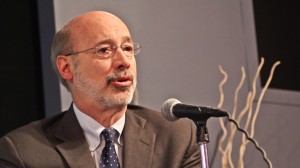Wolf says he would ‘restore trust’ in health department drilling policies
-
Marie Cusick

Kimberly Paynter/WHYY
Democratic gubernatorial candidate Tom Wolf says he would “put a premium on transparency” in how the state handles health complaints related to gas drilling.
Democratic gubernatorial candidate Tom Wolf says he wants to restore public trust in the state Department of Health. The agency was recently accused by former employees of having policies aimed at muzzling its workers on the issue of natural gas drilling.
As StateImpact Pennsylvania has previously reported, two retired state health department workers claim employees were instructed not to respond to phone calls from people who complained about natural gas operations.
In 2012, employees were sent a list of 19 drilling-related “buzzwords” and directed to forward phone calls from people who used those words to the Bureau of Epidemiology. Employees were also required to fill out a permission form and get high-level approval before attending any meetings on topics related to Marcellus Shale development.
While campaigning Wednesday in Chambersburg, Wolf wouldn’t weigh in on specific policies supported by public health advocates– such as increasing funding to the department or creating a public registry of drilling-related complaints.
But he said if he’s elected, he would work to make the department more accountable.
“The idea is to make people actually trust their government—look to government for answers–not to think that we’re alien and the enemy,” he said. “With the Department of Health and throughout my administration I would put a premium on transparency.”
The Health Department says its buzzword list was meant to guide employees in responding to calls—not an effort to silence them.
At a press conference last week, Governor Corbett refused to answer questions about the matter. His spokesman, Jay Pagni, later said the Governor’s office had no involvement in crafting the health department’s policies.
Doctors have noted that some people who live near natural gas development sites have suffered symptoms such as skin rashes, nausea, nosebleeds and other ailments. Some people believe their ill health is linked to drilling, but doctors say they simply don’t have the data or research – from the state or other sources – to confirm that.
















